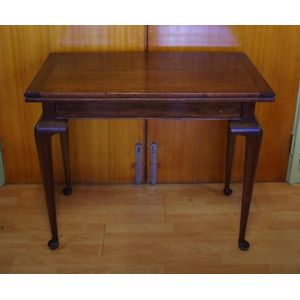Antique Writing Table with Serpentine Front and Gilt Insert Top
Vintage serpentine front writing table with tooled gilt insert top and two drawers on turned fluted legs, 92 cm wide, 42.5 cm deep, 76 cm high
You must be a subscriber, and be logged in to view price and dealer details.
Subscribe Now to view actual auction price for this item
When you subscribe, you have the option of setting the currency in which to display prices to $Au, $US, $NZ or Stg.
This item has been sold, and the description, image and price are for reference purposes only.
- Fluting - A form of decoration found on many pieces of furniture, as well as ceramics, silver and clocks, in which round-bottomed grooves, of varying width and depth, are let into columns, pilasters, legs. As a general rule, flutes are cut in the vertical, though they may follow a turned leg in a spiral pattern. In cross-section, they may be described as a series of 'U' shapes, rising and narrowing at each end of the groove. Fluting is the opposite of reeding, with which fluting is often associated.
- Tooled - Decoration of a leather surface, usually by stamping the surface with a heated punch or wheel containing foliate or geometric designs. In blind tooling the surface of the punch or wheel is in direct contact with the leather, while in gold tooling, a ribbon of gold leaf is placed between the punch or wheel and the leather, and once they have been applied, the excess gold is brushed off, leaving only the design.
- Blind Tooling / Blind Tooled - Blind tooling is a technique used in the decoration of leather goods such as book covers, belts, and wallets. It involves the use of specialized tools to impress designs and patterns onto the surface of the leather without the use of added colour.
The process involves the use of a variety of tools, including stamps, embossing tools, and finishing tools, which are used to create various textures and patterns on the leather surface. The tools are heated, and then pressed onto the leather, leaving an impression. The tools can be used to create designs that are simple or complex, with a variety of textures and patterns, including geometric shapes, florals, or scenes. The leather is then burnished to enhance the design and give it a smooth finish. - Turning - Any part of a piece of furniture that has been turned and shaped with chisels on a lathe. Turned sections include legs, columns, feet, finials, pedestals, stretchers, spindles etc. There have been many varieties and fashions over the centuries: baluster, melon, barley-sugar, bobbin, cotton-reel, rope-twist, and so on. Split turning implies a turned section that has been cut in half lengthwise and applied to a cabinet front as a false decorative support.
- Serpentine - Resembling a serpent, in the form of an elongated 'S'. A serpentine front is similar to a bow front, except that the curve is shallow at each end, swelling towards the middle. The term presumably derives from its similarity to a moving snake or serpent. Serpentine fronts are usually veneered, with the carcase either being cut and shaped from a solid piece of timber, or built in the 'brick' method.
This item has been included into following indexes:
-
desks, style or type
- table style 197
- writing table 128
Visually similar items

Vintage Tasmanian oak card table with fold over swivel top, on cabriole legs, 92 cm wide, 76 cm high
Sold by
in
for
You can display prices in $Au, $US, $NZ or Stg.

Antique cedar side table with 2 drawers, 127 cm wide, 49 cm deep, 82 cm high (at back)
Sold by
in
for
You can display prices in $Au, $US, $NZ or Stg.

An Early Victorian mahogany two drawer writing table. 73 cm high, 106 cm wide, 50 cm deep.
Sold by
in
for
You can display prices in $Au, $US, $NZ or Stg.

Victorian cedar side table with two drawers, one odd leg, 99 cm wide
Sold by
in
for
You can display prices in $Au, $US, $NZ or Stg.
